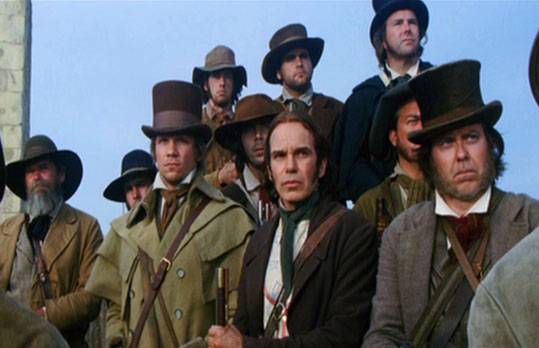“Observers describe Bush as ‘messianic’ in his conviction that he is fulfilling the divine purpose. But, as Lincoln observed in his second inaugural address, ‘The Almighty has His own purposes.’ Invoking also Lincoln’s remarks on the Mexican War, historian Arthur Schlesinger, Jr. laments the rise of preemption, senses dark forebodings in Dubya’s saber-rattling with Iran, and concludes that “there is no more dangerous thing for a democracy than a foreign policy based on presidential preventive war.”
Tag: Mexican War
Mission Compromised.

When writing about Touchstone’s new version of The Alamo, I find myself in a very similar situation as I was post-Hellboy. Part of me really wants to say nice things about this movie. The occasional film flourishes aside (such as Davy Crockett’s last stand), I think The Alamo for the most part tries to get the history right…Dennis Quaid’s Sam Houston is more a whiskey-doused speculator than American hero, Crockett is something of a congressman on the make, and there’s at least a nod to such ugly realities as American slavery and the land-grab nature of the whole Texian enterprise. Moreover, the Mexican view of the battle is also more fleshed out than we’ve come to expect in Alamo movies, even if Santa Anna is played like a straight-up Bond villain. Heck, compared to Gods & Generals, it’s like this movie was written by Howard Zinn and Noam Chomsky.
But, frankly, The Alamo turns out to be kinda dull through most of the middle hour. The set-up is well-done, the payoff is well-done (notwithstanding the twenty minute foray into the Battle of San Jacinto, which reminded me of the Doolittle Raid in Michael Bay’s lousy Pearl Harbor), but the twelve days of siege that comprise much of the movie is ultimately a bore. “Well, Col. Bowie, we’re all going to die.” “Yes sir, Lt. Col. Travis, that’s correct, we’re dead ducks. What do you think, Davy?” “I’m with you fellers. Mincemeat.” Part of the problem in this second act is that the film keeps slipping away from the history in favor of lapses into movie convention. We’ve got Davy Crockett and fiddle having their “King of the World” moment on the eve of the final battle. We’ve got the vaguely rousing “we will go down in history” speech by Travis. We’ve got Jason Patric — surely, the only actor who’s been poised on the brink of the big time longer than Billy Crudup — dying of consumption for interminable stretches, with all the deathbed movie tropes that entails. (Jim Bowie’s bout with sickness holds very little dramatic impact, given that we know he’s on the way out anyway.) For almost all of this section of the film, even as a history buff, I was fidgeting for the big battle to start, and I couldn’t help thinking (and feeling guilty about it) that all of this men-under-siege grimness was done better a year ago in The Two Towers.
Yet, the one major respite from the middle hour’s blandness is Billy Bob Thornton as Davy (“He prefers David”) Crockett. While Sam Houston is sidelined, William Travis is a (pretty good) unknown, and Jim Bowie is moaning and clutching the sheets, Billy Bob’s Crockett is just trying to keep his chin up, and he’s the only character here who seems both realistic and larger-than-life. Throughout the film, even when forced into the most goofy lines or plot devices, Billy Bob/Crockett has a grim, self-deprecating smile on his face that says both “Can you believe it? I’m Davy Crockett!” and “How the hell did I end up dying in this backwater mission?” And some of the best sequences in the film involve Davy ruminating on his own myth, or remembering his days as an Indian fighter. In sum, Billy Bob is so good here that I spent most of the film contemplating who else I’d cast alongside Thornton for the definitive American History miniseries. Christopher Walken as 1850 Henry Clay? Fred Thompson as James Buchanan? Adrien Brody as Mexican War-era Lincoln? The possibilities are endless.

